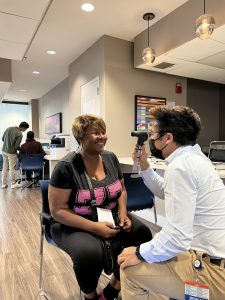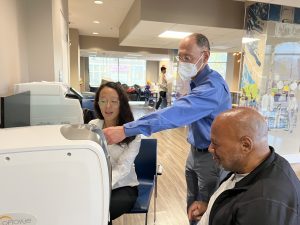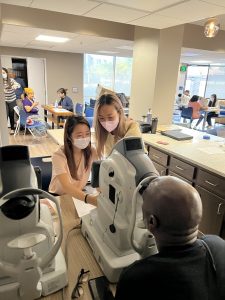Johns Hopkins UniversityEst. 1876
America’s First Research University
When it’s well into December, adding one more item to a to-do list, whether it’s studying for finals or rushing to a child’s school concert, can make even the most organized individual feel frazzled. Yet on a Saturday morning in Baltimore’s Station North neighborhood, a group of dedicated Johns Hopkins medical students and faculty are providing eye screenings for local residents.

The Hopkins volunteers are participating in Vision Screenings in Our Neighborhoods, or ViSION, a Johns Hopkins School of Medicine student-driven organization that conducts free vision screenings for community members in Baltimore in collaboration with community organizations.
“I’m really interested in community health, and ViSION is a very good learning experience for that,” Jane Huang, a second-year school of medicine student, says. “Running the program has helped me see a lot of what goes on behind the scenes in terms of building trust with the community, how we portray ourselves, and the reputation that we’re building through the ways we interact with our patients.”
Huang, along with Stefanie Seo, A&S ’19, also in her second year at the school of medicine, are ViSION’s 2022 co-directors. They manage the medical student governing board for ViSION, which has five subcommittees; coordinate student and faculty volunteers, who have signed up for the twice-monthly Saturday screenings; assist with grant applications; and collaborate with ViSION’s faculty adviser.
“It’s such a big organization,” Seo says of ViSION. “You have people who are in charge of talking with community and faculty leaders, people who are training the medical students, people who are doing follow up. All these components require organization and communication.”
Originally called Student Sight Savers, ViSION was founded by Thomas Johnson III, MD, PhD, in 2011 when he was a Hopkins medical student and secured a grant from Friends of the Congressional Glaucoma Caucus Foundation. Since then, nearly 1,600 Baltimore residents have received screenings and more than 150 medical students and 34 faculty members have volunteered at 45 community screening events.

Today, Johnson, who graduated from the school of medicine in 2014, is the Shelley and Allan Holt Rising Professor and ViSION’s faculty adviser. Support for ViSION continues with grants from other nonprofits, individual donors, and funding from the Johns Hopkins Medical and Surgical Association.
“Dr. Johnson is that continuity for us,” Seo says. “He’s been with us every step, being present when we have new equipment coming in and just being a really great mentor throughout this whole process.”
Along with the management skills Seo and Huang gain in leading ViSION, they receive hands-on training with patients and insight into the ophthalmology specialty. The screenings include using tools like ophthalmoscopes to evaluate patients (adults at least 18 years old) for eye disease and performing several specific types of vision measurements on them with the goal of providing a holistic view of their overall vision.

A faculty mentor, who is also a practicing ophthalmologist, oversees the screenings and involves medical student volunteers in discussions about any needed follow-up care for patients. If they show signs of being at risk for optical disease, such as cataracts or glaucoma, ViSION helps schedule a free visit for further care at the Johns Hopkins Wilmer Eye Institute and coordinates transportation if needed.
“To be able to get attending physicians to come out two Saturdays a month has been incredible, and working with faculty members who are so dedicated to ophthalmology is very valuable to us,” Huang says. “They’re all extremely passionate about teaching, and we learn a lot from them. They go out of their way to show us interesting cases us and pull us aside by saying things like, ‘This image is really interesting. You should take a look at this.’”
Perhaps what is most satisfying for Huang and Seo, though, is the connection they make with Baltimore community members and fellow medical students.
“We have an ophthalmology simulation day, we learn about eye diseases, but we don’t actually get to see how that impacts people in their day-to-day lives. Getting to recognize those signs of disease and getting to connect people to care is really a life-giving one,” Seo says. “And getting to do this with other medical students who are just as passionate about being in the community and ophthalmology has been a fun and cool experience.”
Interested in increasing access to vision services in the Baltimore community?
Topics: Alumni, Faculty and Staff, School of Medicine, Wilmer Eye Institute, Strengthening Partnerships